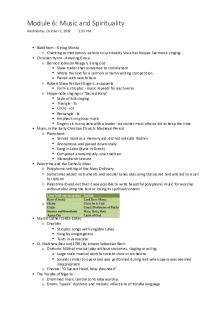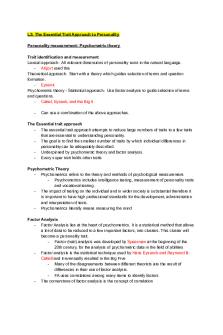Lecture 6 - A skills module with concepts that are essential to the historian and understanding PDF

| Title | Lecture 6 - A skills module with concepts that are essential to the historian and understanding |
|---|---|
| Course | Varieties of History |
| Institution | Newcastle University |
| Pages | 3 |
| File Size | 41.9 KB |
| File Type | |
| Total Downloads | 37 |
| Total Views | 127 |
Summary
A skills module with concepts that are essential to the historian and understanding sources. They are from a variety of lecturers....
Description
HIS1029 – Lecture 6 – Empiricism 2 Introduction – what is post-modernism? - A reaction against modernist tendencies and practices - Established and developing since the 1960s - Not a single school of historians or thinkers – a very dispersed school - Seeks to undermine each of the key dynamics of classical or empirical history - Post modernism was a rejection of modernist thinking – came into history from the 1970s - Demands new approaches - Influenced heavily by French philosophers - No such thing as a postmodernist ‘school’ of historians - Pointing out the need for new approaches to historical analysis - No single school is a single approach - Interdisciplinary
-
-
-
-
Key characteristics of Modernism What the study of history is or should be? VonRanka says you have to see history as it actually was Should and critically can be objective without pre-concieved ideas about why or how events happened We can separate ourselves from topics that we like -approach it free from any social, cultural and economic baggage. By looking at the primary sources we can overcome the bias that is inherent by holding them up to scrutiny and comparing them to others. Motivated by the truth of what actually happened in the past. We don’t want to creat a false histoty we are seeking for the truth that happened in the past. Early ideas about scientific investigation In an ideal world history was a science and not an art – truths that could be tested and uncovered from the past. Classical empiricist would believe that language reflects thought and so reality. As long as those fixed realities and truths were uncovered by the fixed reality you could therefore recreate the past in your writing. When we do that we base it on the assumption that we can find something true. Certain core historical facts that the historian should discover. Hook our interpretation on those facts Understand how something was structured and make assumptions on that. The empirical historian will assume that every individual and society has a fixed and core identity. The Post modern critique Objectivity – post modrnsits reject the notion that history or historians can ever be objective, impossible and undesireable. We strive to be objective but postmodernists don’t agree. Hisotrians impose their own values on how they think about the past. Unconscious biased as well.
-
-
All that exists is all the histroians write about. All we study is historigiograhy – the pas as seen through the words of other historians The primary sources that historians base their research Those primary sources are full of gaps – never have a complete picture of the past. Historians select from the sources of the past to suit themselves. Postmodernsits reject the notion it can be objectuve and is scientific. Each historian has to interpret the past as they are conditioned to do so Mankind is incapabale of being irrational Reality – no fixed historical reality. That primary sources has no fixed meaning – no fixed truth or reality. Historical documents and artefacts will be interepreted differently by different people and so have no fixed meaning. Therefore what happened in the past is not something that we can recover as historians. History is simply a series of texts on events of the past – it is one long story. Highlihg this idea of fiction. Have no ficed meaning Central to this is the idea of language. Language means different things to different people at different times. Deconstructing language to discover things about power structures of the past. Applied to all fields of art and humanities studies.
-
Callum Brown Postmodernism for Historians Why they did certain things A post modernist would say look at how people thought about themselves. This means the historian is a post structuralist. How language is used in the past to describe those power structures. In british history a huge amount of writing about class. There is no fixed reality about social class – looking at structure and class.
-
-
-
-
-
Facts For the postmodernist there are no facts, they dispute the view that history is based on hisroical facts but that thre are historical narrativs – fictious story telling about the past. Can be no facts, only narratives. Translate raw material into our own words – into a narrative. Post modernists are interested in the ways Persuasive acts of fiction, tneyre saying that hsistoy is dangerous. Histroisn hold a place of some authority in society. Post modernists are trying to make us critical of this. The facts only speak when historians call upon them – have to study the historian before you can understand their facs. History is just fiction described as facts. History is relative and subjective and a linguistic construct. Structure of society and its governing impulse Argue that the concept of society is false and should be abandoned. Society is not a coherent Should have instead the concept of social structures and individual.
-
-
-
We should be looking st the individual experience because that is the only possibility. No long possible to manufacture historical arguments. Post modernists criticise historians for putting people into fixed identities. You have multiple identities. No one identity should e seen as more important than the other. Postmodernisn and its use by historians New aim in historical enquiry, deconstruct the language embedded in historical texts to understand the way in which power operates. Some historians welcome new sophistication in understanding lnaguaage and discourse e.g. impericial history. Historians defence of empiricism Historians have also fought back and criticised postmodernisn on the following grounds Hypocrisy Denial of historical events Understates traditional methods of hisorrical enquiry...
Similar Free PDFs

Module 1 — Understanding the Self
- 23 Pages

Understanding The Self Lesson 6
- 4 Pages

Module 6 - Lecture notes 6
- 2 Pages

Module 6 lecture
- 10 Pages

Reyes, A Module 6
- 6 Pages
Popular Institutions
- Tinajero National High School - Annex
- Politeknik Caltex Riau
- Yokohama City University
- SGT University
- University of Al-Qadisiyah
- Divine Word College of Vigan
- Techniek College Rotterdam
- Universidade de Santiago
- Universiti Teknologi MARA Cawangan Johor Kampus Pasir Gudang
- Poltekkes Kemenkes Yogyakarta
- Baguio City National High School
- Colegio san marcos
- preparatoria uno
- Centro de Bachillerato Tecnológico Industrial y de Servicios No. 107
- Dalian Maritime University
- Quang Trung Secondary School
- Colegio Tecnológico en Informática
- Corporación Regional de Educación Superior
- Grupo CEDVA
- Dar Al Uloom University
- Centro de Estudios Preuniversitarios de la Universidad Nacional de Ingeniería
- 上智大学
- Aakash International School, Nuna Majara
- San Felipe Neri Catholic School
- Kang Chiao International School - New Taipei City
- Misamis Occidental National High School
- Institución Educativa Escuela Normal Juan Ladrilleros
- Kolehiyo ng Pantukan
- Batanes State College
- Instituto Continental
- Sekolah Menengah Kejuruan Kesehatan Kaltara (Tarakan)
- Colegio de La Inmaculada Concepcion - Cebu










